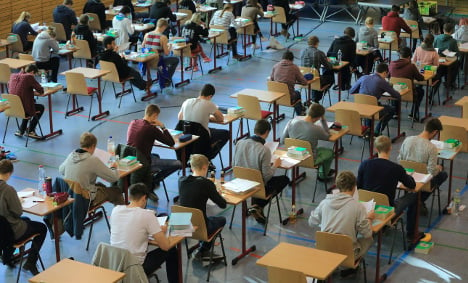Abitur lottery sparks tougher exam debate

How well students do in their high school diploma, the Abitur, is down to hard work, but also in which Bundesland they go to school. Regional comparisons in Abitur grades have revealed worrying levels of variation.
The Abitur is the qualification that pupils take in the final two years at a Gymnasium, a selective state school comparable to a UK grammar school, which is designed for supposedly more academic students. Around 30% of German secondary school pupils attend Gymnasiums.
Those who take the Abitur must choose four or five subjects, including at least one science, one humanity/social science, and a language or art.
Various assessments over the two years, including big final exams, amount to an overall grade, which ranges from one to six. 1,0 is the best grade possible and is equivalent to an A* or A+, anything under 2,0 is an A grade, and 4,0 or under is considered a pass.
Completing the Abitur allows you to apply for university, but getting a good grade can really broaden your range of options.
The Abi-Lottery
According to a statistics published in Der Spiegel this week, the national average percentage of Abitur students who receive grades of 1,9 or better is 23.1 percent.
But regional variations can be enormous. In the state of Thuringia, for example, the same figure is 37.8 percent, while it stands at 15,6 percent in Lower Saxony.
Only 13.9 percent of Abitur students in Bavaria scraped a pass with a grade between 3,0 and 4,0, but nearly double that number did in Rhineland Palatinate.
The quality of state schools is bound to vary around the country, but experts worry that the exams, which are set separately by each state for its own pupils, may not be at the same standard of difficulty.
Chairman of the German Teachers' Association (DPV), Heinz-Peter Meidinger, fears that the Abitur is increasingly losing its value.
"In lots of cases today it is very doubtful whether actual competence lies behind the qualification awarded with the Abitur," he said.
"What is certain is that there is too much variation in Abitur grades in Germany, which means the standards aren’t comparable.
"The people really getting the bad end of the deal are the top students, whose excellent achievements are lost in the sea of other top grades."

Reform?
Standardization of the Abitur will be on the agenda at the Education Ministry Conference on Thursday and Friday in Berlin.
While conference chairwoman Brundhild Kurth (CDU) doesn’t see the situation as too big a problem, she said: "We have to achieve some sort of comparability, because it is also linked with equality of opportunity."
Attempts to standardize the qualification have already been made, and some changes will come into force for the 2016/17 school year.
There will be compulsory elements in the exams for German, maths, English and French, but states still have the power to tweak things.
But schools and state governments are reluctant to change, according to Meidinger: "It is all a result of reciprocity. The schools do well because the students are getting good marks, and the local government is doing well because their schools are high-achieving, which reflects well on their education policies," he said.
Birgit Klabuert, education minister for Thuringia, the highest achieving state for Abitur grades, showed this as she lauded praise on her local schools this week. "The school system in Thurungia works towards achievement, and deserves it too," she said.
Is it getting easier?
As well as the regional variations, Meidinger believes the diploma has become easier in general. "The massive increase in the number of students attaining a 1 grade clearly isn't because of a sudden explosion of talent among Abitur students," he said.
The overall average grades have improved in recent years, but the big increases have come in the number of students attaining very top grade of 1,0, the holy grail of the Abitur.
In Berlin the number of students with this grade stood at 17 in 2005, but in 2012 it leapt to 234. In Hamburg it was 48 in 2005 but 113 in 2012, and in North-Rhine Westphalia it was 421 in 2006 but a whopping 1200 in 2012.
Comments
See Also
The Abitur is the qualification that pupils take in the final two years at a Gymnasium, a selective state school comparable to a UK grammar school, which is designed for supposedly more academic students. Around 30% of German secondary school pupils attend Gymnasiums.
Those who take the Abitur must choose four or five subjects, including at least one science, one humanity/social science, and a language or art.
Various assessments over the two years, including big final exams, amount to an overall grade, which ranges from one to six. 1,0 is the best grade possible and is equivalent to an A* or A+, anything under 2,0 is an A grade, and 4,0 or under is considered a pass.
Completing the Abitur allows you to apply for university, but getting a good grade can really broaden your range of options.
The Abi-Lottery
According to a statistics published in Der Spiegel this week, the national average percentage of Abitur students who receive grades of 1,9 or better is 23.1 percent.
But regional variations can be enormous. In the state of Thuringia, for example, the same figure is 37.8 percent, while it stands at 15,6 percent in Lower Saxony.
Only 13.9 percent of Abitur students in Bavaria scraped a pass with a grade between 3,0 and 4,0, but nearly double that number did in Rhineland Palatinate.
The quality of state schools is bound to vary around the country, but experts worry that the exams, which are set separately by each state for its own pupils, may not be at the same standard of difficulty.
Chairman of the German Teachers' Association (DPV), Heinz-Peter Meidinger, fears that the Abitur is increasingly losing its value.
"In lots of cases today it is very doubtful whether actual competence lies behind the qualification awarded with the Abitur," he said.
"What is certain is that there is too much variation in Abitur grades in Germany, which means the standards aren’t comparable.
"The people really getting the bad end of the deal are the top students, whose excellent achievements are lost in the sea of other top grades."

Reform?
Standardization of the Abitur will be on the agenda at the Education Ministry Conference on Thursday and Friday in Berlin.
While conference chairwoman Brundhild Kurth (CDU) doesn’t see the situation as too big a problem, she said: "We have to achieve some sort of comparability, because it is also linked with equality of opportunity."
Attempts to standardize the qualification have already been made, and some changes will come into force for the 2016/17 school year.
There will be compulsory elements in the exams for German, maths, English and French, but states still have the power to tweak things.
But schools and state governments are reluctant to change, according to Meidinger: "It is all a result of reciprocity. The schools do well because the students are getting good marks, and the local government is doing well because their schools are high-achieving, which reflects well on their education policies," he said.
Birgit Klabuert, education minister for Thuringia, the highest achieving state for Abitur grades, showed this as she lauded praise on her local schools this week. "The school system in Thurungia works towards achievement, and deserves it too," she said.
Is it getting easier?
As well as the regional variations, Meidinger believes the diploma has become easier in general. "The massive increase in the number of students attaining a 1 grade clearly isn't because of a sudden explosion of talent among Abitur students," he said.
The overall average grades have improved in recent years, but the big increases have come in the number of students attaining very top grade of 1,0, the holy grail of the Abitur.
In Berlin the number of students with this grade stood at 17 in 2005, but in 2012 it leapt to 234. In Hamburg it was 48 in 2005 but 113 in 2012, and in North-Rhine Westphalia it was 421 in 2006 but a whopping 1200 in 2012.
Join the conversation in our comments section below. Share your own views and experience and if you have a question or suggestion for our journalists then email us at [email protected].
Please keep comments civil, constructive and on topic – and make sure to read our terms of use before getting involved.
Please log in here to leave a comment.